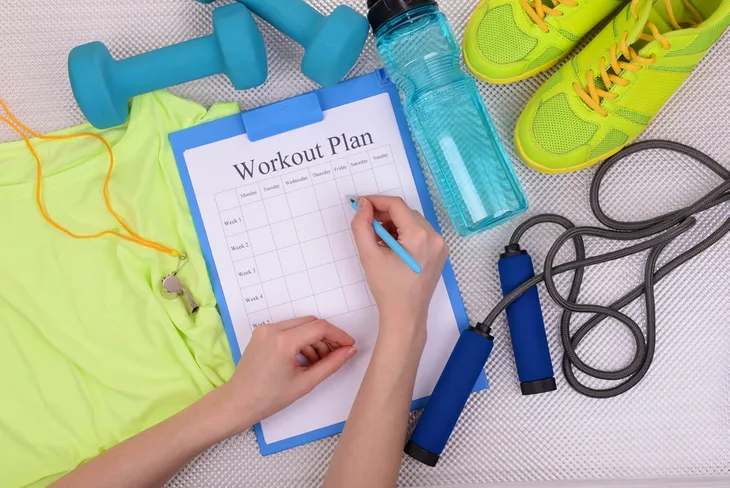In just a few short weeks, winter will officially begin. But depending on where you live, the winter weather is already here and it may already be taking a toll on the healthy lifestyle you’ve worked hard for. Whether you typically eat too much comfort food and desserts, or exercise less (or not at all), winter can really hurt your health. This year, instead of sitting back and accepting the unhealthy changes in your life, make an early resolution to stay active, eat right, and in the process, help ward off seasonal depression. Sounds easy, right?
The best strategy to beat these negative habits is to be proactive, so start now by implementing some of the following ten tips to stay healthy this winter. There’s nothing better than reaching the end of the coldest season feeling and looking your best…
Make a Plan
People are easily knocked off their healthy routine because of how busy the start of the winter season is. With holiday celebrations beginning at the end of November and carrying you into the new year, it’s no wonder people ditch their regular routine—maintaining it can seem insurmountable.
However, don’t let busy weekends and winter break get in the way of being healthy. It may seem stressful, but map out the first month or two of the winter season. Add family and other social commitments, camps (if you have kids), and any big work deadlines. Doing this will allow you to see where you have free time to fit in exercise or plan an active outing.
Add Something Active to Social Gatherings
Much of the holiday season is filled with getting together with family and friends. And the cold weather usually worsens after the holidays, which tends to keep us inside. Instead of agreeing to and falling into this social hibernation, suggest the group does something active during the get-together.
There are fun activities for both children and adults—hiking through forests, sledding, skiing, and skating are just a few. Even when it’s just adults in the group, kids aren’t the only ones who can enjoy the snow! Of course, be safe by wearing appropriate clothing and protective gear if you’re going to be outside for long periods of time, and don’t ignore severe cold warnings.
Eat Healthy Meals As Often As Possible
It can be tempting to resort to your favorite comfort foods during winter. It’s common to crave warm casseroles, pastas, and other heavy, carb-filled meals, but many of these comfort foods aren’t healthy. Add in holiday gatherings and you’re likely to greatly increase your fat, sodium, sugar and calorie intake during the cold months.
To combat this unhealthy habit, plan to eat healthy meals rich in vegetables as often as possible—many veggies might be out of season but that shouldn’t stop you from eating them. When you do indulge, don’t go overboard, moderation is key and you can still enjoy some of your winter favorites without adding to your waistline.
Snack on Healthy Food
Many people find themselves snacking more in winter. It could be from the winter blues dragging you down and causing you to eat your feelings and stress, or it could simply be the change the season has on your body and mind. Whatever leads you to snack more, it doesn’t need to be an unhealthy habit.
In fact, snacking can be quite good for you, as long as you aren’t loading up on foods high in sugar and fat or that can make you feel sluggish. Snack on foods that have antioxidants, vitamins, protein and fiber—a well-rounded diet will satisfy your hunger while also boosting your energy and strengthening your immune system.
Try a New Exercise or Train For a Race
Sometimes the best way to ensure you stay active all winter long is by changing up your regular workout. Holiday commitments at the beginning of winter are likely to mess with your schedule anyway, so join a new exercise class at the start of the season to set the tone for the coming months.
Exercising outside in the winter is often impossible depending on where you live, so try an indoor class that catches your eye. Or sign up for a race in the spring—this will motivate and force you to exercise regularly in order to be ready for it. Try a regular running race or something trendy, like a zombie run.
Join a Club or Plan Regular Gatherings
After the high of the holiday season, it’s easy to fall into a slump. The parties are over, and the reality of winter can seem even more depressing after such excitement. Since your mental health is just as important as your physical health, join a club or enroll in a course.
It’s the perfect opportunity to try something new, meet new people, and get out of the house at least once a week. Once you’ve committed to something, it’s more effective in getting you to follow through. You should also plan regular social gatherings – even meeting up for a coffee with a friend can give you a much-needed boost.
Get Enough Sleep
Getting a good sleep every night should be a goal year-round, yet it’s something that so many people don’t follow through on. When you’re stressed and have a busy schedule, sleep is often the first thing people give up, but letting your sleeping habits suffer can hurt your health.
Sleep is the way your body refuels. With too little of it, you’re more likely to skip on hitting the gym or making a healthy meal. When you don’t get enough sleep, especially during times of stress and a hectic lifestyle, your immune system is weaker and more vulnerable to viruses. And if you don’t rest enough when you’re sick, it’s going to be more difficult to get better.
 Shutterstock
ShutterstockWatch Your Alcohol Intake
It’s not that people drink more alcohol during winter, but they do tend to drink it in large—and sometimes unsafe—quantities. For many, the holidays are filled with laughter, happiness and all-around cheer. From religious traditions and New Year’s Eve to work parties and social gatherings, it’s fairly common for people to throw caution to the wind and consume more alcohol because “it’s the time of year”.
However, using this excuse over and over again throughout the month will add up. Alcohol is high in calories, and excessive drinking can damage your health. Know your limit and remember to dress warm if you’re going out drinking, alcohol can numb your senses, putting you at risk.
Make Time to De-Stress
Winter weather—shorter days, cooler or downright cold temperatures, rain, and snow—can have a negative impact on all areas of your health. It can cause you to feel lousy and lazy, lose your motivation to exercise, and increase your stress, often resulting in Seasonal Affective Disorder (aka winter depression), weight gain, and general unhappiness that affects your personal and professional relationships.
However, you can fight back and have a healthy, happy winter by making the time to let go of the stress. Officially schedule it into your calendar and don’t cancel on yourself. Meeting with friends, curling up with a good book, exercising, playing a sport – whatever helps you blow off steam, do it regularly.
Protect Against Cold and Flu Viruses
Pretty much everyone has had the common cold or flu at some point in their life. You’ve also probably had one or two really bad ones that kept you in bed for days or even weeks. While taking certain vitamins and making healthy choices in the winter can help keep your immune system strong, even the healthiest of people get sick sometimes.
To help protect yourself against the cold and flu this winter season, make sure you wash your hands regularly (especially after touching doors, taking public transit, and so on), get the flu shot or at least learn more about it, and get plenty of rest if you feel something coming on.












